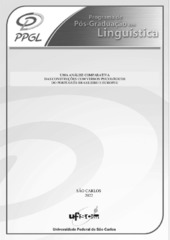Uma análise comparativa das construções com verbos psicológicos do português brasileiro e europeu
Resumo
Psychological verbs (such as shake, afflict, and thrill) denote a feeling or emotional state in the
experiencer, the experiencer being necessarily human. This research describes the phenomenon
of constructions with psychological verbs in Portuguese and presents a contrastive analysis of
studies on the classification of these constructions carried out for Brazilian Portuguese
(CANÇADO, 1995; CANÇADO et al., 2017[2013]) and European Portuguese (MACEDO
OLIVEIRA, 1984; MENDES, 2004; BAPTISTA AND MAMEDE, 2020). Thus, it will be
possible to identify the points of intersection and divergence between these two variants of the
Portuguese language. For this, the theoretical-methodological model used is the Lexicon Grammar (GROSS, 1975), which establishes principles of description and systematic
classification of the predicative elements of languages, based on Distributionalism and
Transformational Theory of Zellig Harris (1961; 1964). From the data described here, it is
expected to contribute to the linguistic description of the phenomenon of constructions with
psychological verbs, as well as to the development of linguistic resources that can be used in
different didactic applications and in Natural Language Processing (NLP).
Collections
Os arquivos de licença a seguir estão associados a este item:

